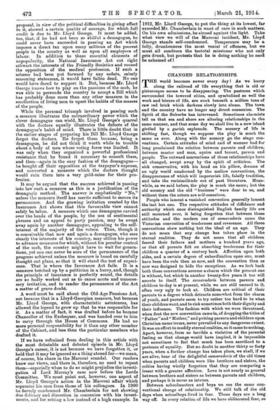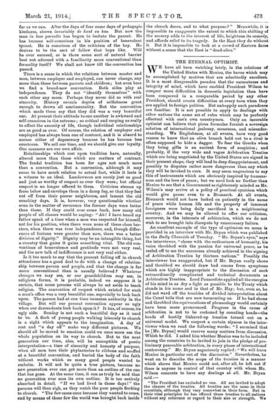CHANGED RELATIONSHIPS.
fr HE world becomes newer every day ! As we hurry along the railroad of life everything that is old or picturesque seems to be disappearing. The pastures which surrounded the towered cities, and symbolized so well the work and leisure of life, are sunk beneath a million tons of raw red brick which darkens slowly into slums. The town and the country have no longer any direct connexion. The Spirit of the Suburbs has intervened. Sometimes alarmists tell us that sea and shore are altering relationships in the name manner, and that some day we shall live in a new island girdled by a garish esplanade. The scenery of life is shifting fast, though we suppose the play is much the same as ever. Along with the scenery go the stage con- ventions. Certain attitudes of mind and of manner had for long proclaimed the relation between parents and children, between master and man, squire and tenant, parson and people. The outward conventions of those relationships have all changed, swept away by the spirit of criticism. The sick conservative, with his head on his pillow, dreams of an ugly world unadorned by the mellow conventions, the disappearance of which will impoverish life, falsify tradition, and take the verisimilitude out of past literature. Mean- while, as we said before, the play is much the same; but the old scenery and the old "business" were dear to us, and without them the actors are self-conscious.
People who lament a vanished convention generally lament the last but one. The respective attitudes of diffidence and authority which once distinguished English family life are still mourned over, it being forgotten that between those attitudes and the modern one of camaraderie came the Victorian convention of tenderness and reverence. All three conventions show nothing but the ideal of an age. They do not mean that any change has taken place in the eternal realities. They do not mean that all children feared their fathers and mothers a hundred years ago, or that all parents felt an absorbing tenderness for their children a quarter of a century back. Affection upon both sides, and a certain degree of subordination upon one, must have been the rule then as now, and the convention then as now was designed to hide the exceptions. As we look back both these conventions assume a charm which the present one is without, but which in another twenty-five years it too will accrete to itself. The camaraderie between parents and children to-day is at present, while we are still unused to it, often very ugly to look at. Children are critical of their parents to a degree which detracts somewhat from the charm of youth, and parents seem to try rather too hard to be what. their children wankand to risk sometimes both their dignity and their influence. The fashion with which we were threatened, when first the new convention came in, of dropping the titles of "Father" and "Mother," and putting parents and children upon Christian-name terms, never prevailed to any dangerous extent. It was an effort to modify eternal realities, so it came to nothing. Apart, however, from so terrible a violation of the parental feeling as that change would have implied, it is impossible not sometimes to feel that much has been sacrificed to a pretence of equality. But no doubt in another thirty or forty years, when a further change has taken place, we shall, if we are alive, hear of the delightful camaraderie of the old times when parents and children were like brothers and sisters, the critics having wholly forgotten that they are comparing a lesser with a greater affection. Love is not nearly as general between brothers and sisters as between parents and children, and perhaps it is never as intense.
Between schoolmasters and boys we see the same con- ventional change of relationship. We still talk of the old days when schoolboys lived in fear. Those days are a long Way off. In every relation of life we have obliterated fear, so far as we can. After the days of fear came days of pedagogic kindness, shown invariably de haul en bas. But now the man in loco parentis has begun to imitate the parent. He has become self-conscious in his position of benevolent tyrant. He is conscious of the criticism of the boy. He desires to be the sovt of fellow that boys like. Will he ever succeed, or is there some sort of natural barrier best not adorned with a familiarity more conventional than formality itself P We shall not know till the convention has passed.
There is a sense in which the relations between master and man, between employer and employed, can never change, any more than those between parents and children; but even here we find a brand-new convention. Both sides play at independence. They do not "identify themselves" with each other any more. Perhaps they never did so with real sincerity. History reveals depths of selfishness great enough to drown all sentimentality. But the convention which made them say that they did was a very beautiful one. At present their attitude to one another is awkward and self-conscious in the extreme ; so critical and carping as really to affect the amenity of life, though individual relationships are as good as ever. Of course, the relation of employer and employed has always been one of contract, and it is absurd to accuse either of degeneracy because he has become less courteous. We sell our time, and we should give our loyalty. Our manners are our own affair.
Relationships which rest upon tradition have, naturally, altered more than those which are matters of contract. The feudal tradition has been for ages not much more than a convention. But a convention, although it may cease to have much relation to actual fact, while it lasts is a witness to an ideaL Landowners are surely just as good and just as worthy of respect as ever they were; but official respect is no longer offered to them. Criticism steams up front below and envelops them in a damp fog, so that they feel out off from their poorer neighbours, and lament the old sunshiny days. It is, however, very questionable whether even in the matter of reverence the former days were better than these. If they could ever come back, how many old people of all classes would be saying: "Ah! I have heard my father speak of a time when a man was respected for himself, not for his position, when there were none of these class bar- riers, when there was true independence, and, though differ- ences of fortune were greater than now, there was a better division of dignity." Dignity may be an intangible thing, but a country that gains it gains something vital. The old con- ventions of benevolence and gratitude were not very real, and the new talk of indifference is not very real either.
Is it too much to say that the present falling off in church attendance has a good deal to do with a change of relation- ship between parson and people, and that the change is far more conventional than is usually believed P Whatever changes we may see, or our grandchildren may see, in religions forms, it is probable, indeed we suppose it is certain, that some persons will always be set aside to teach religion. The convention of respect which existed for such a man's office was a very beautiful one, especially to look back upon. The parson had at one time immense authority in the village. But will our present convention appear so ugly when our descendants look back upon it ? It has, of course, its ugly side. Sunday is not such a beautiful day as it used to be. A flock of young people walking leisurely to church is a sight which appeals to the imagination. A day of rest and "a day off" make very different pictures. We should all be moved to emotion could we once more see the whole population on its way to church. But to the next generation our time, also, will be susceptible of poetic interpretation—a time of sincerity and honesty of purpose, when all men tore their phylacteries to ribbons and scoffed at a beautiful convention, and buried the body of the faith without works which so many good people wanted to embalm. It will not be quite a true picture, because no new generation ever can get more than an outline of the one that has gone. At the same time, it can as truly be said that no generation ever sees its own outline. It is too entirely absorbed in detaiL "If we had lived in those days!" the parsons will then sigh, as they watch the poor people flocking to church. "The few came once because they *anted to come, and by means of those few the world was brought back inside the church doors, and to what purpose P" Meanwhile, it is impossible to exaggerate the extent to which this shifting of the scenery adds to the interest of life, heightens its comedy, and affords relief to its tragedy. In the East they do without it. But it is impossible to look at a crowd of Eastern faces without a sense that the East is "dead-alive."











































 Previous page
Previous page